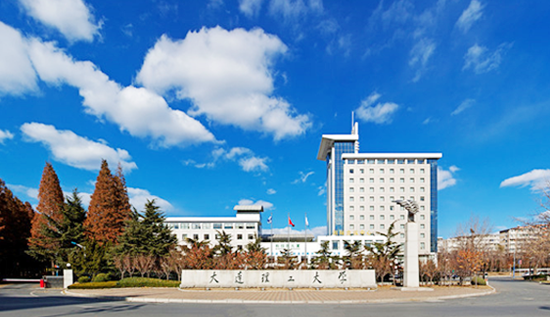
Located in the beautiful coastal city of Dalian, northeastern China's Liaoning Province, Dalian University of Technology (DUT) is a national key university directly administrated by the Ministry of Education of China. It is a prominent institution in both the “211 Project” and “985 Project,” and was recognized as a Category-A university under China’s “Double First-Class” initiative in September 2017.
DUT is dedicated to cultivating exceptional talent, advancing technological innovation, inheriting excellent culture and setting social standards, Guided by the DUT spirit—“Embracing all, relentless in self-improvement, rooted in virtue and scholarship, unified in knowledge and action”—the university takes on social responsibility, supports national strategies, and strives for the betterment of humanity.
 Dalian University of Technology was founded in April 1949 as the Engineering College of Dalian University. It was part of the post-war effort to rebuild China’s technological capacity. When Dalian University was disbanded in July 1950, the engineering college became an independent institution and was renamed Dalian Institute of Technology. In October 1960, it was designated as one of China’s first key universities and placed directly under the administration of the Ministry of Education.
Dalian University of Technology was founded in April 1949 as the Engineering College of Dalian University. It was part of the post-war effort to rebuild China’s technological capacity. When Dalian University was disbanded in July 1950, the engineering college became an independent institution and was renamed Dalian Institute of Technology. In October 1960, it was designated as one of China’s first key universities and placed directly under the administration of the Ministry of Education.
The Graduate School was established in April 1986, and the institution officially adopted its current name, Dalian University of Technology, in March 1988. In 1996, DUT was included in 211 Project under a joint agreement with the Ministry of Education, Liaoning Province Government, and the Dalian Municipal Government. In 2001, it became part of 985 Project as a key university jointly supported by the same trio.
In December 2012, the Ministry of Education approved the establishment of DUT’s Panjin Campus. In September 2017, with approval from the State Council, DUT was selected as a Category-A university under China’s “Double First-Class” initiative. In February 2022, it retained its position in the second round of this initiative.
The university employs approximately 4,500 faculty and staff, including 3,000 full-time teaching faculty members. Among them, 13 are academicians of the Chinese Academy of Sciences or Chinese Academy of Engineering. Additionally, 940 faculty members hold full professorships, while 1,250 hold associate professorships.
Twelve faculty members serve on the State Council Academic Degrees Committee, 123 are recipients of the National High-Level Talent Program, and 186 have been awarded the National Science Fund for Outstanding Young Scholars. The university is also proud to have 11 National Teaching Masters, 123 Provincial Teaching Masters in Liaoning, and 8 designated Teaching Masters under the “Xingliao” Talent Program.
The university currently has a total enrollment of approximately 49,600 students, including 25,500 undergraduates. The graduate student body consists of 24,100 students, with more than 5,800 doctoral students, supervised by over 1,400 doctoral advisors, and over 18,300 master’s students, supervised by more than 2,570 master’s advisors.
Committed to the core mission of “fostering virtue and nurturing talent,” the university has established a world-class disciplinary structure encompassing “top-tier engineering, high-quality sciences, excellent liberal arts, and emerging medicine,” with equal emphasis on both undergraduate and graduate education. The Graduate School oversees 27 independent schools, a Faculty of Medicine, two research institutes, and one residential college on the main campus. The Kaifaqu Campus hosts two additional schools, and the Panjin Campus accommodates four more. Additionally, two specialized schools (School of Innovation and Entrepreneurship and School of International Education) and one independent college (City Institute) complete the university’s academic structure.
DUT offers 39 first-level.master’s programs, 29 first-level doctoral programs, and 28 post-doctoral research stations. It also grants seven Doctor of Professional Degree (D.Prof.) categories, including mechanical engineering, materials and chemical engineering, electronic information, civil and hydraulic engineering, energy and power, resources and environment, and biological and medical sciences. Additionally, the university offers 15 professional master’s degree categories, including business administration and public administration. Furthermore, the university is authorized to grant master’s degrees to in-service faculty members.
At the undergraduate level, the university offers 78 majors, including 23 natioanl distinctive programs, 57 “Double First-Class” national first-class programs, 17 provincial first-class programs, 27 programs accredited by the China Engineering Education Accreditation Association assessment, and six programs selected for the Ministry of Education’s “Qiangji Plan” (Plan for strengthening basic academic disciplines). Additionally, five national 2.0 bases focus on cultivating top students in basic disciplines, while four national teaching bases promote pedagogical innovation. DUT also serves as as discipline-training base under the National Talent Scheme for gifted undergraduates.
The university boasts eight national experimental teaching demonstration centers, three national virtual simulation centers, and seven national teaching teams. DUT is one of the first ten pilot universities for the Ministry's “Three All-Around Education” reform, one of the first ten national engineering education reform institutions, and an inaugural site for the National Undergraduate Innovation and Entrepreneurship Training Program.
It holds dual status as a first-batch national Innovation and Entrepreneurship College and off-campus start-up base, is a first-wave demonstration university advancing enterprise-driven education reform, and was an early participant in the “Excellent Engineers Education and Training Program.” DUT also leads one of the first public foreign language teaching reform pilots and hosts a national center for integrating civic values into university curricula.
Mechanics, Mechanical Engineering, Chemical Engineering, and Technology at the university have been selected for the second round of the national “Double First-Class” construction disciplines list. With frontier disciplines rich in resources and strong research capabilities, there are 21 first-class disciplines selected for Liaoning Province’s first-class disciplines construction project. There are 4 national key first-level disciplines and 6 national key second-level disciplines. In the results of the fourth round of national discipline evaluation, 7 disciplines were ranked in Category A, and 19 disciplines entered into Category B. In the first national assessment of professional degree programs, Business Administration and Public Administration were awarded A and A- respectively. A total of 34 disciplines were listed in the Shanghai Soft Science Best Disciplines Ranking, and 14 disciplines were in the top 10% nationwide. 31 disciplines were listed in the Times China Discipline Rating Ranking, including 4 A+ disciplines and 24 A- disciplines. There are 12 disciplines ranked in the top 1% globally, with 4 disciplines—Engineering, Chemistry, Materials science, and Computer science—ranked in the top 1,000 of the world; 8 disciplines are ranked in the top 500 of QS World Ranking of Academic Disciplines. In the ranking of soft science world-class, US News and other academic disciplines, Ship and Ocean Engineering is ranked in the 4th place internationally, Instrumentation Science as the 12th place, Chemical Engineering as the 14th, Civil Engineering as the 15th, Mechanical Engineering as the 22th, Electronics and Electrical Engineering as the 34th, and Artificial Intelligence as the 36th place in the world.
In the “Double First-Class” initiative, DUT focuses on building eight discipline clusters—Chemical Engineering & Chemistry, Advanced Equipment Manufacturing, Ocean Engineering, Transport Engineering, Information Science, Management, Mathematics & Physics, and Life Medicine—plus Marxist Theory, forming the “8 + 1” cluster model.

Internationalization is one of the important strategic goals of DUT. The university is actively advancing the “Belt and Road” education initiative and strengthening its international collaborations across various regions, with a focus on deepening cooperation in Northeast Asia and enhancing ties with Europe and the United States. DUT has established long-term stable collaborations with 338 universities and research institutions across 47 countries and regions. The university has also initiated several international alliances, including the China Excellence Universities Alliance-Japan’s Six National Universities Alliance, the China-Ukraine Universities Alliance, and the China-Belarus Universities Alliance, and is a member of the China-Russia Engineering Universities Alliance, among other international networks. DUT operates 3 Sino-foreign cooperative institutions with Ritsumeikan University, the University of Leicester, and Belarusian State University respectively, as well as a cooperative program with University of California, Irvine. Additionally, DUT runs over 500 student exchange programs, including state-sponsored scholarships, joint training, exchange programs, and short-term visits, sending approximately 2,500 students abroad each year. Each year, the unviersity also invites nearly 600 overseas experts and scholars for teaching and research visits. Since 2024, DUT has hosted 3,145 international students, 57.8% of whom are degree-seeking.
(Data as of May 2025)



